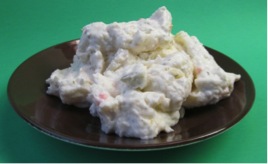Don Mercer
There’s an old adage that states, “It’s better to be safe, than sorry”. Nowhere is this more true than when dealing with the food we eat.
As someone who has spent almost forty years in various food-related activities, food safety is a major concern to me. While preparing course material, I often search the Internet on the topic of foodborne illnesses. One thing that tends to stand out is the number of “food poisoning” cases that are attributable to improperly stored foods – especially during the hot summer months when family and group picnics are in full swing.
To illustrate our point, we can use the example of making a potato salad for a family picnic set for a hot summer Sunday afternoon. When properly stored, there should be no problems encountered with the salad. However, for our purposes, we will set up a hypothetical scenario to show what might go wrong with improper handling.
Like most people, you probably begin actually preparing the food for your picnic the day before the big event. Now, let’s track each step of the process when adequate care is not taken.
Once the potatoes are selected, washed, peeled, and cut (if necessary), they are boiled in water on the stove until they are sufficiently cooked. After draining any excess water from the pot, the potatoes are usually too hot to handle. They may be cooled by running them under cold water, which also removes excess surface starch, or they may simply be left to cool in the pot.
Even though they are still warm, the potatoes can be cut into chunks for the salad, or mashed, as the case may be. At this stage, the potatoes are also exposed to the cutting board, utensils, and counter surfaces; as well as your hands, and the air in the kitchen. If ever there was an opportune time for microbial contaminants to jump on board, this would be it. For any microorganisms that do manage to get into the salad, it’s not a bad place to be – but wait, it’s actually going to get better for these little invaders.
You may find that it’s best to put the partially prepared potato salad in the refrigerator overnight and finish it in the morning. However, the cold air in the fridge may not do as much as you think to deter the microorganisms that are present. They still have some good growth time left before the temperature falls below their growth limiting temperature of about eight to ten degrees Celsius. They’ll just lie dormant if and when the temperature ever falls to the normal refrigerated temperature of four degrees.
If it’s a large bowl of salad that was made late the previous evening, chances are reasonably good that the potatoes are not fully chilled by morning. Even if they are, they can easily warm up during the day ahead. Early Sunday morning, you add mayonnaise and other ingredients to the potatoes and mix them thoroughly. This may allow more microorganisms from the surrounding air and surfaces to join the crowd. Microorganisms that thought they had a good thing going Saturday night are now positively ecstatic. They’ve just been given an even better growth environment. The mayonnaise is not too acidic, it’s not too basic, and there are lots of available nutrients. These “bugs” are in their Goldilocks zone – everything is “just right”.
Without time to do much more before you rush out the door and drive to your picnic location, you simply cover the salad bowl with a lid or foil, and try to fit it into the picnic cooler. With everything else you are taking, the salad bowl just won’t fit; so it has to sit beside the cooler in the trunk of the car. While in the trunk, the salad is either staying warm, or getting warmer, much to the delight of the microorganisms that have come along for the ride.
At your picnic site, you and all the others place your coolers and food on the picnic tables, then settle down to relax and get caught up on all the family news, while the kids play before eating.
By the time the meal is served, your salad has enjoyed a ride in the nice warm car trunk plus additional time in the outdoor heat on the picnic table. All this time, the contaminating microorganisms that came along Saturday night have been merrily increasing in number, undetected by anyone.
Although everyone feels fine when they leave the gathering Sunday evening, Monday morning may bring some discomfort for those who ate the salad.
I don’t mean to be an alarmist, but with a little awareness, caution, and planning, many of these problems can be avoided, and your summer fun will not be marred by unwelcome microbiological picnic visitors.
Keeping sensitive foods adequately chilled may be a challenge, but it’s absolutely essential from a food safety perspective. So, keep it cool and enjoy your potato salad.

Potato salad is a favourite at picnics,
but it must be kept chilled
Dr Don Mercer is Associate Professor in Food Science, Department of Food Science, University of Guelph, Guelph, Ontario N1G 2W1, Canada; e-mail: dmercer@uoguelph.ca
Permission to reproduce this article is greatly appreciated and acknowledged.
IUFoST Scientific Information Bulletin (SIB)
FOOD FRAUD PREVENTION